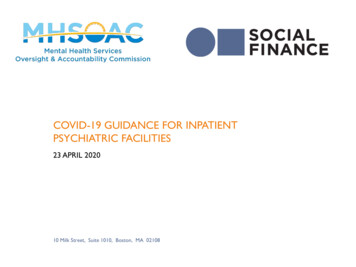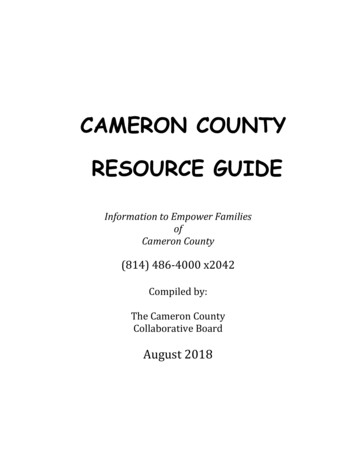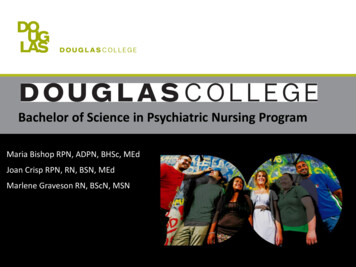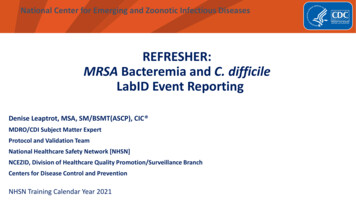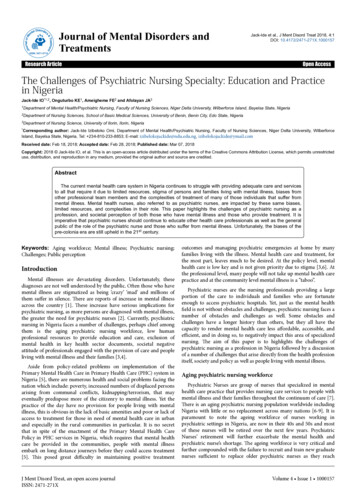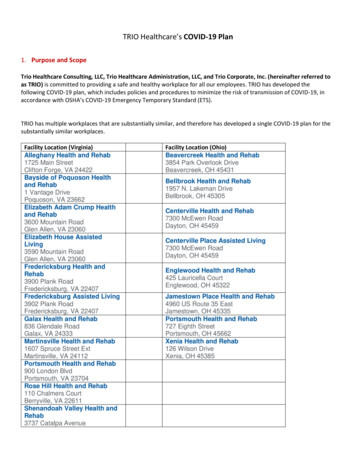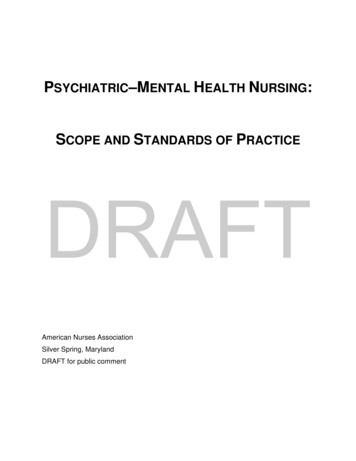
Transcription
Inpatient PsychiatricProgramPatient & Family Handbooki
Welcome to the short-term Behavioral Health Unit at EnglewoodHealth. The information in this handbook will be helpful to youduring your stay here.The primary goals on our unit are to help you to becomeemotionally stable in a therapeutically healing environment and topartner with you on planning an appropriate outpatient plan foryour discharge.Our treatment teams take a collaborative, integrative approach tohealing. Your team will include your psychiatrist, nurse, socialworker, patient care associate, recreation therapist, occupationaltherapist, and creative arts therapist. Together, they arededicated to treating you with the utmost respect and kindness.We want you to feel as safe and comfortable as possible, soplease don’t hesitate to ask our staff for assistance at any time.Important Phone NumbersEnglewood HospitalPay phonesNurse’s stationLinda Leighton, nurse managerJo-Ann Venezia, program director201-894-3000201-608-2176 or llway patient phones, for placing and receiving calls, are free. They areturned on at 8:00 a.m. and off at 10:30 p.m., as well as during alltherapeutic group times. Phone calls are limited to 10 minutes per call.Your social worker can facilitate long-distance calls.
Confidentiality and PrivacyYour privacy is protected by HIPAA (Health Insurance Portability andAccountability Act) provisions. We ask that you respect the privacy of othersand refrain from going into other patients’ rooms. Additionally, when speakingon the unit phone, do not reveal any confidential information about otherpatients. Common areas are under video surveillance for your safety.Patient RoomsYou have been assigned a room based on availability and your needs. We willassist you with linens, towels, and toiletries as needed. As part of the overalltreatment, you are encouraged to use your daily living skills to make your bedand keep your room neat, if you are able to. Housekeeping staff clean thebathrooms and floors and empty the trash on a daily basis. For your safety andfor the privacy of others, please do not enter other patient rooms.ClothingWe encourage you to get out of bed each morning, take a shower, and put onappropriate clothing. Staff will guide you on what is appropriate to wear on theunit. Please refrain from wearing tight, revealing, or provocative clothing.Patients placed on constant observation are to wear the blue hospital gown atall times. (Exceptions are made for geriatric patients who are at risk of falls.)T-shirts with alcohol or drug advertisements are not permitted. Staff membershave the ultimate discretion in determining what is appropriate clothing.LaundryA washer and dryer are available on the unit for your convenience. Last wash isat 9:30 p.m., and laundry detergent is available for your use. Staff will assistwith laundering clothing if necessary.Personal BelongingsFor your safety and the safety of other patients, many common items are notpermitted on the unit. All belongings will be searched and checked in by stafffor safety.Safety-Risk Items Not Permitted on the BehavioralHealth Unit: Belts, ropes, electrical wires and cords, scarves, nylon stockings/pantyhose and knee highs, shoelaces, drawstrings of any kind (e.g.,sweatshirts, sweatpants, jackets), bags with long handles or straps.1
Sharp objects: scissors, nail clippers, knives, needles/pins, razors andrazor blades, pencil/makeup sharpeners. Glass items: bottles, jars, mirrors, office supplies associated with dangerrisk (metal spiral notebooks, metal paper clips, letter openers, springclips, tape dispensers, staplers). Personal grooming items: coloring agents, hair removal products/chemicals, metal files, sharp hair accessories, nail polish/remover, flat orcurling irons. Metal Items: Cans and lids (soda can, potato chip can lid, pull tabs). Toxic substances: alcohol and alcohol-based products such asmouthwash, nail polish/remover, aerosol cans, paints, model glue. Tobacco and tobacco-related products: cigarettes includinge-cigarettes, cigars, loose tobacco, chewing tobacco, rolling papers,pipes; flammable substances (lighter fluid, lighters, matches, fuel, paintthinner, flints). Electronics: cell phones, PDAs, pagers, Kindles, personal computers,iPads, iPods, and similar devices; cameras (film, digital, and videocameras, recording devices). Wallets, cash, checkbook, credit cards. Medications/herbal supplements: Will be sent home or to the hospitalpharmacy. Miscellaneous: plastic bags of any kind, jewelry chains.Clothing and personal belongings left behind after discharge will be sent tosecurity for retrieval.Meals and SnacksThree meals are served each day, as well as evening snacks. Each day, you willreceive a menu from which to make your selections. No last-minute changesare permitted. Meals are served in the patient dining room and kitchen. If yourequire a special diet for health or religious reasons, it will be provided. Pleaseplace your tray in the food cart when you are done eating. Staff will assist youif needed. Consultation with a dietitian is available at your request or at yourtreatment team’s recommendation. If visitors bring you food, please consumeit during their visit and send any leftovers home or discard them, as there islimited space on the unit. We are unable to keep leftover food in therefrigerator. Kitchen: Opens at 6:00 a.m., closes at 11 p.m. and during all therapeuticgroup times.2
Dining room: Opens at 7 a.m., closes at 12:30 p.m. and during alltherapeutic group times. Senior lounge: Opens at 8 a.m. and closes at 11 p.m. and during alltherapeutic group times.Snacks are available in the kitchen for patients only. If family or friends bringsnack items for you, you must consume them during their visit. All snacks willbe sent back home or disposed of after the visit, because of space limitations.VisitationVisiting hours are 12:30 p.m. – 7:30 p.m. daily.Visiting hours are limited to these times to avoid any conflicts with therapeuticprogram activities in which you are expected to participate.Family and friends are welcome to visit. Visitors must be 18 or older and arelimited to two at a time, because of limited space. For your safety, visits maytake place only in common areas, not in patient rooms. Visits are held incommon areas of the dining room and kitchen, and in the senior lounge.Patients and visitors are expected to conduct themselves in accordance withprogram rules, keeping in mind patient safety and social courtesy. Visitationmay be restricted at the discretion of your treatment team.Unless you have signed consent for the release of information to a particularindividual visiting you, your confidentiality will be maintained, and informationwill not be available to your visitors. The staff will assist you if you would like torestrict visitors. For your safety, any belongings or food your visitors bring youmust be checked by the staff at the front desk on the unit.SafetyTo ensure your safety while in our care, we follow a number of protocols. Doorsleading into the unit are kept locked, and you will be allowed to leave the unitonly upon discharge. Upon admission to the unit, your belongings are checked,so any items potentially harmful to those on the unit can be either locked up orsent home. (Please refer to the list of safety-risk items on page 3.) Some itemsmay be used with staff supervision or in therapeutic groups/activities (e.g.,knitting needles, yarn). There may be items that you will not have access to atall during your stay. Nurses may also remove additional items at theirdiscretion, if they feel they pose a risk to you or others. There is videosurveillance in common areas for your safety.3
Staff will make visual checks on you throughout the day, for your safety. Pleasekeep your door slightly ajar at night, to avoid being awakened by the sound ofthe door latch opening and closing. If you are in the bathroom and do notrespond verbally, staff will need to enter the bathroom to check on you. Weask that you refrain from showering between 11 p.m. and 6 a.m. Patients arepermitted to shave only under staff supervision.Please do not share personal belongings or money or give them to otherpatients. An item that is safe for you to use may not be safe for others, puttingthem at risk.While you are on the unit, there may be times when you feel overwhelmed byyour thoughts or feelings. Before they become too much for you and put youand/or others at risk, we suggest that you talk with staff, go to your room todecrease stimulation, or request medication. If these measures do not help youto calm yourself and you become physically threatening, staff may need to usede-escalation techniques to help you regain control.It is important that you refrain from the use of foul or offensive language; staffmay intervene if you continue to use inappropriate language on the unit. It isalways our goal to keep you safe and provide you with a therapeuticenvironment. Physical contact, verbal and physically aggressive behaviors, andother unsafe behaviors will not be tolerated and can lead to an administrativedischarge from the hospital.SmokingEnglewood Hospital is a no-smoking campus; there is no smoking anywhere inthe hospital or on the hospital grounds. Smoking materials, includingcigarettes and e-cigarettes, cigars, chewing tobacco or tobacco in any form,lighters, and matches will be taken upon admission, locked up, and returned toyou at discharge. Nicotine patches can be ordered by your doctor to addressnicotine cravings. Patients who receive smoking materials or other contrabandfrom visitors will have restrictions placed on their visiting privileges. If you areinterested in quitting smoking, please inform your nurse or psychiatrist.Treatment Team MembersYour treatment team includes your psychiatrist, nurse, social worker,recreational and creative therapists, and patient care associates. The teammembers work together to coordinate your care while you are in the hospitaland to plan your follow-up care when you are discharged. You will meet theteam members and have an opportunity to talk with them, both as a group and4
individually, during your hospital stay. Staff photos are displayed on the wallacross from the nurse’s station, to help you familiarize yourself with everyoneon your team.You will be assigned a psychiatrist, who will see you within 24 hours of youradmission. This may be the same psychiatrist who saw you in the emergencyroom. Your psychiatrist will meet with you daily and determine your need formedication, provide psychotherapy, and oversee management of your careduring your hospital stay.You will be assigned a registered nurse for each shift. The nurse will work withyou and your significant other, or other family member, as appropriate incollaboration with the team, to establish a care plan that meets your mentaland physical needs. You will be learning therapeutic communication techniquesand other ways to improve your communication. Your nurse will providesupport, as well as psychosocial interventions and medication education. He orshe will also assist you in establishing boundaries to enhance your safety andthat of others.During your stay, you will also be assigned a social worker, who will interviewyou and obtain a psychosocial history, which will aid in formulating yourtreatment plan. Your social worker will talk with you about your livingcircumstances, your relationships, any environmental stressors you may beexperiencing, and any community resources you are involved with or may needupon discharge. The social worker will also ask your permission to speak withfamily members who may have information that could be helpful in yourtreatment or who want to know how they can support you in your recovery,especially after discharge. During the first week of your hospital stay, the socialworker will arrange a family meeting; further family meetings may beappropriate prior to discharge. Formal consent to release information isrequired for any member of the treatment team to speak to others about youor your care.You also will meet with recreational, creative arts, and/or occupationaltherapists to discuss how you spend your leisure time at home and in thecommunity, any interests or activities in which you may be involved, and anyspecial learning needs you may have. They will provide therapeutic unitactivities on a daily basis.You will also work with patient care associates. These treatment teammembers work closely with the nurse and provide help with eating, bathing,5
and walking. They also take your vital signs and encourage you to attendgroups and activities.You will have a physical examination by a physician or nurse practitioner. Thephysician or nurse practitioner may prescribe medication for your physicalneeds and will collaborate with your psychiatrist on your treatment.Spiritual NeedsA hospital chaplain and a Eucharistic minister are available to meet with youindividually, to address your spiritual needs. Catholic Mass is celebrated on theunit, usually on Wednesdays. You also will be given an opportunity to attend aspiritual support group. Please inform a staff member if you wish to be visitedby your own clergy.MedicationIf your psychiatrist prescribes medication for you, you will be called to the deskat the appropriate medication times. You may have medications that you canrequest on an as-needed or “prn” basis. Tell your nurse if you feel you needthese medications.In general, your medications will be the same as your home medications.Depending on your condition and diagnosis, upon admission to the hospital,some of your home medications may be put on hold or discontinued. Yourpsychiatrist may discuss starting new medications with you. For your safety,each time you receive medication, the nurse will verify your name and birthdate, checking them against your medication record, and will bar code themedication.We want you to understand the benefits of taking your medications, bothduring your hospital stay and when you are discharged. Feel free to askquestions; you should know the name, actions, and potential side effects of allyour medications. It is important that you talk with your psychiatrist and nurseabout your medications and how they are affecting you.Every effort will be made to select medications that are available to you throughyour insurance carrier or treatment provider after you are discharged from thehospital. Tell your social worker if you anticipate difficulty in obtaining medications.Do not take any medications you brought with you from home, as we need toknow exactly what medications you are taking. Please give any suchmedications to your nurse.6
Treatment GroupsTherapeutic groups are an important component of patient life on thebehavioral health unit and are integral to your treatment plan. On 4 East, weoffer cognitive behavioral therapy (CBT), discharge preparation groups, andmedication education groups, as well as a variety of expressive therapies andactivities, including movement therapy, music therapy, art therapy, creativearts, poetry therapy, and drama therapy. We also offer recreation therapy,occupational therapy, and psycho-educational groups.By attending groups, you will learn that others have problems similar to yours.Groups and activities will give you an opportunity to work on issues that mayhave contributed to your admission. In addition, your participation in theseactivities gives the staff an opportunity to evaluate your progress, in terms ofyour mood and thinking, as well as how you relate to others. This informationwill be helpful to your physician in planning your treatment.Our goal is to stabilize your symptoms, while helping you to manage what maybe a recurring illness. All groups contribute to your healing, as you gain newinsights and develop better coping strategies, maximizing your level ofemotional and social functioning. These groups also allow individuals toexperience a sense of community and connection, mitigating feelings ofaloneness.Telephones are not available during group times, to allow you to participatefully in the program. During all therapeutic groups, the kitchen and diningrooms are closed, and TVs are turned off.All therapists on the unit have master’s degrees and are licensed and certifiedby their respective discipline. Many RNs also have master’s degrees and/or arecertified in psychiatric/mental health nursing by the American NursingCredentialing Center (ANCC).Pet TherapyWe are pleased to offer pet therapy twice weekly. Feel free to come and meetour certified pets when they visit.Request for Release (Discharge)If at any time you would like to be discharged, please see your nurse or socialworker and complete a request for release letter in writing. Your physician willdiscuss your request with you. Once you have signed the request for release7
letter, the psychiatrist has up to 48 hours to determine if you are safe to bedischarged or if you require evaluation by the psychiatric emergency screeners.DischargeBecause we are a short-stay stabilization program, hospitalization on our unit isusually brief. As part of your treatment, you will be asked to actively participatein planning your discharge. Your treatment team will ask you how you think youhave progressed and may also ask family or friends, whom you have identified,how they think you are doing.Your psychiatrist will make the final decision as to your discharge date. At thetime of discharge, you need to understand your medications, to have ascheduled appointment for care after discharge, and to have instructions onwhat to do if you need help once you are discharged. It is not uncommon forpatients to form relationships during hospitalization and to want to continuethose contacts after discharge. We respectfully request that former patientsnot visit until at least six months after discharge, to allow for support in thecommunity.As part of the discharge process, you will be asked to complete a satisfactionsurvey. We care about your perceptions of our hospital and how our staffmembers have worked together to care for you. We want to use your feedbackto improve our setting and services for future patients. Please let us knowduring your stay if you have any concerns, so we may address them.Discharge time is 11 a.m.At the time of discharge, you will be given a copy of a crisis prevention plan,which will assist you with decision making after your hospital stay.Financial ConcernsWhether or not you have health insurance, you may have questions or concernsrelated to the cost of your care during your stay. Feel free to discuss these withyour social worker.Patient RightsNew Jersey mental health laws protect your rights as a recipient of mentalhealth services. As part of the admission process, you are given a booklet titled“Your Rights When Receiving Mental Health Services in New Jersey.” If youhave concerns about a rights violation, contact the hospital patient advocate at8
201-894-3368. A statement of patient rights is displayed next to the nurse’sstation at the front of the unit, as well as in each patient room.Crisis HotlineWe want you to be aware of community resources that can assist you if youfind yourself in crisis any time after discharge from the hospital. The free andconfidential National Suicide Hotline (suicidepreventionlifeline.org) can bereached 24/7 by dialing 800-273-TALK (8255). You may want to keep thisnumber some place where it can be easily located in a time of crisis.Notes9
350 Engle Street, Englewood, NJ 07631201-894-3000englewoodhealth.orgEnglewood Health complies with applicable federal civil rights laws anddoes not discriminate on the basis of race, color, national origin, age,disability, or sex.Para asistencia lingüística gratuita, llamar al 201-894-3368.무료 통역 서비스를 원하시면 201-894-3368로 문의바랍니다.10
Englewood Hospital 201-894-3000 Pay phones 201-608-2176 or 201-608-2177 Nurse's station 201-894-3142 Linda Leighton, nurse manager 201-894-3147 Jo-Ann Venezia, program director 201-894-3959 Hallway patient phones, for placing and receiving calls, are free. They are turned on at 8:00 a.m. and off at 10:30 p.m., as well as during all

